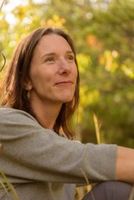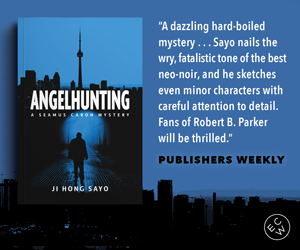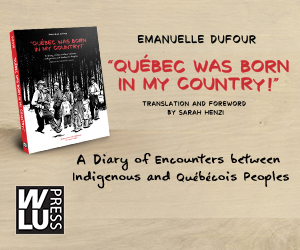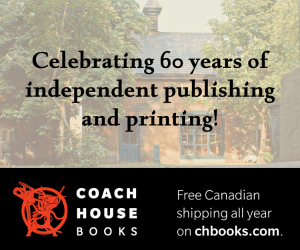On Writing, with Clea Roberts
Yukon poet Clea Roberts has been published around the world, and her 2010 debut collection, Here Is Where We Disembark, had everyone eager for more. Her anticipated new collection, Auguries (Brick Books) satisfies the thirst handily, with poems that touch on wilderness and the erotic, as well as domestic life and the complications of family love. Balanced, flowing, and sparse, these poems bring the crisp precision of her first collection and add an even more intense emotional underpinning.
We're pleased to speak to Clea today about Auguries. She tells us about working on a collection in the midst of both death and birth, the meaning behind her sky-focused title, and why fiction is up next for her.
Open Book:
Your work has been described as containing a unique northern sensibility. Do you agree with that assessment in relation to Auguries and if so, how would you describe a northern aesthetic?
Clea Roberts:
I think it’s inevitable that a writer’s landscape seeps into their writing, whether they are writing from an urban, a rural, or a wild place. I’ve been in the North for over 15 years now, and the majority of important things in my life have happened here. These things fuel my writing, and the North informs the internal and external landscape of my poems.
I’m not sure that there is a northern aesthetic, anymore than there is a southern one. There is a lot of diversity in the North that extends past the obvious stereotypes. A northern sensibility, however, can entertain this diversity (in all its surprising permutations). I think a northern sense of self puts one distinctly outside the centre, and perhaps this perspective, of being an outsider, of seeing oneself in the context of a vast, unpeopled wilderness is often what is captured in northern writing.
OB:
You experienced big life events while writing this collection. In what ways did you find those experiences manifesting in your writing process?
CR:
During the course of writing these poems, I became a parent and I lost a parent. Through both of these experiences, I came to realize that poetry was a form of expression I consistently turned to when processing joy and grief (two states that are really just different sides of the same coin). Poetry has a natural tendency to plumb our depths, and the work we do writing a poem externalizes whatever truths or emotions reside deep within us. Poetry is an act of self-expression that, for me, is often a necessary part of fully experiencing joy and healing from grief.
When my children were born, my sense of mortality became amplified. I also experienced happiness, love, and devotion with a purity and strength I hadn’t thought possible. When my mother died, I ruminated a lot on death and how to live peaceably with the certain uncertainty of it. But immersing myself in the world of the dying made me appreciate life with a new acceptance, lightness, and intensity. I like to think I’ve brought the things I’ve learned from becoming a mother and losing my mother into my poems.
One thing I learned was that joy and grief can flow from unexpected sources. When my children were babies, I struggled with post-partum depression. It didn’t seem right that I should feel sad during what was supposed to be such a joyful time in my life. I really beat myself up about it, which made me feel worse. Then one day, a woman who led a group for new mothers told me “sometimes, you need to let yourself feel a bit of grief in motherhood, because you’ve lost big parts of your former life and identity.”
My mother and I had a lot of joyful (and often humourous) moments in her last years and months and days. My mother couldn’t use her hands toward the end, but wanted to write her obituary, so I sat with her and held the pen. She didn’t know where to start, so I began an inventory of what I thought were her interests. I said, “She liked to cook?” My mother replied very seriously, “No, she never liked to cook.” Thinking for a moment, my mother turned suddenly joyful and said, “She loved to entertain!”
Your CanLit News
Subscribe to Open Book’s newsletter to get local book events, literary content, writing tips, and more in your inbox
OB:
Your title refers to the ancient practice of interpreting the future or omens in the flight patterns of birds. How did you come across this interesting word and practice, and how did it become the title of your collection?
CR:
I’m always looking up at the sky. I love watching birds. Birds are full of poetry. I have a particular fascination with corvids (the bird family that includes ravens, crows, magpies, and jays, to name a few). They are always doing or saying something interesting. They are so common and yet so remarkable. In case you are wondering, those are grey jays (also known as camp robbers or whiskey jacks) on the cover of my book.
I’ve always thought of ravens as having a druidic quality to them, and as there are so many of them in the Yukon, they occupy a lot of my time. They are tricksters, as you’ve probably heard, and they are forever throwing in their “two bits” of commentary from the top of a lamppost or a tree as you are walking somewhere. The quality of their call is multi-vocal and prophetic and always seems to say, “You know the answer, just think about it.”
Because, as with the last book, there are a lot of birds in this book, Auguries seemed like a good title. I suspect the augurs, like the poets, didn’t really have the answers. They just provided a different frame through which to see the world.
OB:
Where did you do most of the writing for this book? Can you tell us a little bit about what a typical writing day consisted of for you during this project?
CR:
These poems have been everywhere! I wrote many of the poems at home in Whitehorse. I finished a substantive rewrite in Helsinki. I was also fortunate to have two wonderful residencies at Leighton Artist Colony in Banff, which greatly helped me get my head around some of the longer poems in the book, like “Perseids” (about awe as a state of grace) and “Morning Practice” (about my yoga practice and the body’s role in containing and releasing our personal narratives). Until I built a studio in my backyard, writing residencies were essential for gathering my thoughts and reconnecting with my creative self. The world doesn’t really want you to be a poet. And I’m okay with that, but I’m also okay with making space and time to write poetry.
OB:
What will you be working on next?
CR:
Right now, my work is learning how to write fiction. Writing fiction uses a completely different part of my brain. I’m absorbed in the muscular dynamics of plot and character, which is to say, the frequency and duration of my daydreaming has increased exponentially.
But that doesn’t mean I’m done with poetry. I don’t see poetry as a stepping-stone to prose at all. I know I’m going to want to come back to certain subjects in poetry in the near future, because it creates a presence that I haven’t experienced in other forms. Poetry is also a very personal medium, and when I am writing about personal things, I want to be close to the words.
__________________________
Clea Roberts lives on the outskirts of Whitehorse, Yukon Territory. Her debut collection of poems, Here Is Where We Disembark (Freehand Books, 2010), was a finalist for the League of Canadian Poets’ Gerald Lampert Award, was nominated for the ReLit Award, and was translated into German and Japanese. Clea’s poems have been published in journals and anthologies in Canada, Europe, the United States, and Australia. She facilitates a workshop on poetry and grief through Hospice Yukon and is the Artistic Director of the Kicksled Reading Series.




